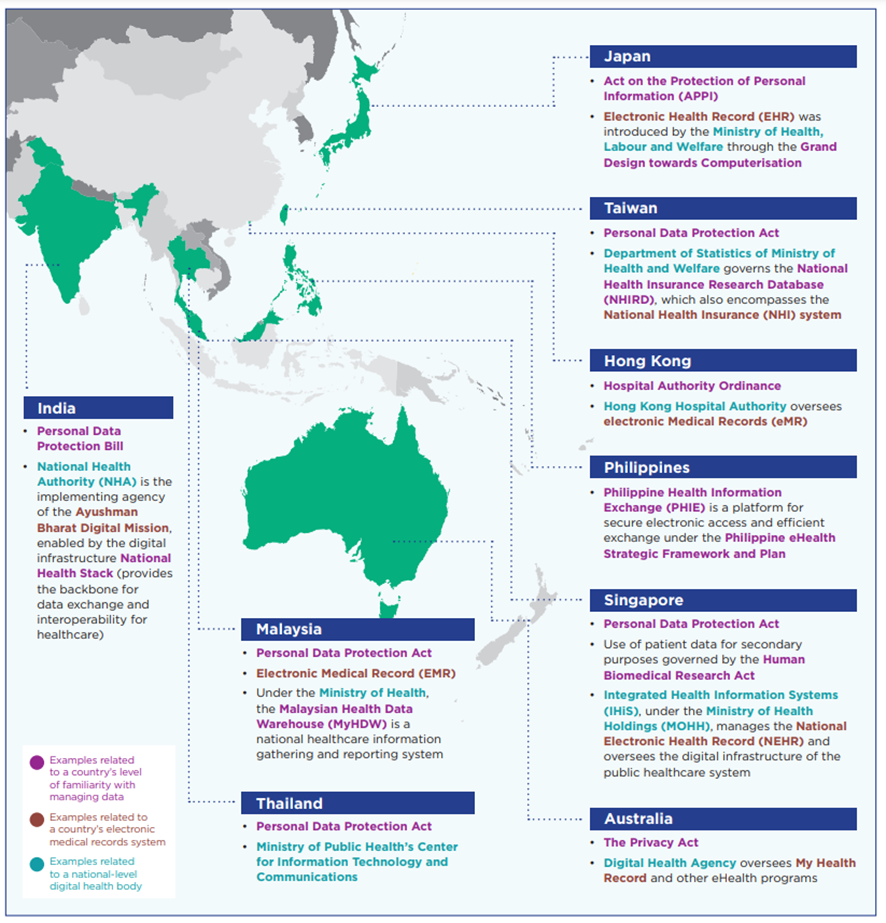This is an excerpt of the publication “Responsible data sharing in health and healthcare”, with the title above, focusing on the topic in question.
National University of Singapore
Precision Public Health — Asia society
Dr Clive Tan; Ms Nikita Kanumoory Mandyam; Ms Immanuela Asa Rahadini; Ms Jacqueline Yap
June 2022
Edited by
Joaquim Cardoso
Health Management — Foundation
Digital Health — Institute
Data Health — Unit
June 22, 2022
Key messages
Countries are at different stages of maturity and development
A self-assessment based on these three factors can help identify and understand the country’s current state and enable plans for progress towards a stronger health and healthcare data sharing ecosystem.
- The country’s level of familiarity with managing data, data sharing arrangements and data sharing technology
- The prevalence of the use of electronic medical records systems by healthcare providers and stakeholders in the healthcare ecosystem
- The presence of a national-level body that is responsible for the development of the health and healthcare data sharing ecosystem
Recognising the challenges and tangible actions for stakeholders, is required.

Introduction
The accelerating digital economy has led to an unprecedented advent of new technologies, generated high amounts of data and lowered costs of data storage and sharing.
As Asia becomes more affluent and undergoes a demographic transition due to its ageing population, investments and spending in health and healthcare have grown.
Health and healthcare are increasingly digital, resulting in greater access to services and a growing amount of health data.
The use and integration of health and healthcare data, coupled with artificial intelligence or machine learning, in identifying needs and offering personalised interventions present potentially significant benefits for public health.
However, data are often fragmented and dispersed across multiple databases held by different stakeholders.
With a wide range of data privacy laws, data sharing infrastructures, digital expertise and financing across the region, there is no established nor clear way of how to move forward to encourage cross-border data sharing in health and healthcare.
COUNTRIES ARE AT DIFFERENT STAGES OF MATURITY AND DEVELOPMENT
Three factors were identified from the roundtable discussions as important considerations for assessing a country’s level of development and maturity regarding data sharing in health and healthcare.
A self-assessment based on these three factors can help identify and understand the country’s current state and enable plans for progress towards a stronger health and healthcare data sharing ecosystem.
- The country’s level of familiarity with managing data, data sharing arrangements and data sharing technology
- The prevalence of the use of electronic medical records systems by healthcare providers and stakeholders in the healthcare ecosystem
- The presence of a national-level body that is responsible for the development of the health and healthcare data sharing ecosystem
1.The country’s level of familiarity with managing data, data sharing arrangements and data sharing technology
Building data sharing expertise, capabilities and technology often do not start in the health and healthcare sector but rather in sectors such as finance, commerce, trade and law enforcement.
A country’s level of familiarity with managing data, data sharing arrangements and data sharing technology is often observable through its overall supporting IT infrastructure, the presence of relevant regulations and the strength of its national and sectoral data sharing frameworks.
Advancements with data sharing in other sectors are positive developments for the sharing of health and healthcare data.
2.The prevalence of the use of electronic medical records systems by healthcare providers and stakeholders in the healthcare ecosystem
Digitalisation of medical records is a good indicator of a country’s readiness to adopt data sharing in health and healthcare.
Several organisations have put in place tools to measure this, such as the Healthcare Information and Management Systems Society’s (HIMSS) Electronic Medical Record Adoption Model (EMRAM).
Hospitals and healthcare providers around the world can be evaluated by HIMSS to assess and understand their stage of digital maturity, on a scale of 1 to 7 with level 7 being the highest score.
While it is encouraging for countries to have healthcare providers who have attained high levels of digitalisation and electronic medical records (EMR) usage, it is perhaps more important to look at the level of EMR usage across a range of healthcare providers in the country when assessing the country’s readiness for data sharing.
3.The presence of a national-level body that is responsible for the development of the health and healthcare data sharing ecosystem
Countries in the region with an agency or government body appointed to oversee health and healthcare data are well placed to convene stakeholders, set standards, assign responsibilities and promote best practices for the country.
For example, Australia’s Digital Health Agency established in 2016 has helped to fast-track greater use of electronic health records, electronic prescribing and shared health and immunisation records across the country
Figure 1 highlights some examples of the current state of data sharing in health and healthcare relating to the aforementioned three factors in countries and territories in the Asia Pacific region, that were brought up by the roundtable experts.
Figure 1: Data Sharing Initiatives in Health and Healthcare in the Asia Pacific

RECOGNISING THE CHALLENGES AND TANGIBLE ACTIONS FOR STAKEHOLDERS
Countries in the region are at different stages of digital maturity.
They will need to overcome their own unique set of challenges so that the region can move towards a more progressive, responsible and widespread data sharing ecosystem in the health sector.
Experts at the roundtable sessions shared on the challenge of fostering political will and the importance of vested stakeholders in creating momentum for data sharing initiatives at the outset.
In circumstances where developments are progressing slowly, the root causes may trace back to national geopolitical issues or from conflicts between different stakeholders within the health and healthcare data sharing ecosystem.
Stakeholders may also be held back by the belief that health and healthcare data are more sensitive than other types of data, and from a lack of technical know-how on the next steps to take.
However, the COVID-19 pandemic is a great example of how progress can be rapidly made if there is a strong collective vision and a pressing need to share data.
Against the backdrop of the pandemic, countries were able to come together to rapidly foster political will to share data about the virus genome, transmissibility and vaccination rates across borders.
For data sharing to take place, the data must first exist in digital form and be accessible.
In certain settings, health and healthcare data are still paper-based and that is a major barrier to participating in the data sharing conversation. With the growing recognition of the value of data, many organisations have moved on to digitise their data.
However, ensuring that the data are accessible remains a challenge as there is a tendency to protect data and layer on administrative red tape. Such challenges exist even within organisations where data sharing between departments may be suboptimal.
The situation can be improved as stakeholders develop clear regulatory and legal frameworks that allow and encourage data sharing as the baseline default state.
This can be done with clear rules, guidelines and measures in place to prevent abuse, ensure security and address privacy concerns.
The value and benefits of data sharing can be better optimised when more stakeholders can participate in and be part of the data sharing ecosystem.
From a regional perspective, there is a need to increase investments to build technical capacity and interoperability in countries that are still developing their capabilities in this domain.
To improve equity, it is crucial to ensure that the gap between countries does not widen further as technology continues to advance.
The differences in countries’ developmental stages across the region also mean that best practices and recommendations will need to be contextualised according to respective countries’ needs and development priorities.
As a result, there cannot be a one-size-fits-all solution.
These political, regulatory, technological and cultural concerns must be identified and addressed to advance national-level data sharing and move towards cross-border data sharing in the longer run.
The rest of this report will provide insights on several of these challenges and offer recommendations on tangible steps that stakeholders can take to realise this vision.
Originally published at https://pphasia.com












